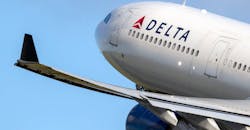For manufacturers, supply-chain uncertainty has been status quo since early 2020. The prospect of import tariffs on virtually every source of foreign-manufactured goods is turning uncertainty into confusion – as the commercial aircraft market is demonstrating now.
CEO Ed Bastian declared Delta Air Lines will defer deliveries of any Airbus jets that may be affected by import tariffs, revealing the scope of the confusion for manufacturers amid the uncertainty of the Trump Administration trade policies.
That aerospace market already was demonstrating uncertainty. Late last month Delta cut its first-quarter profit and sales forecasts due to weakening demand for domestic travel.
“With broad economic uncertainty around global trade, growth has largely stalled,” Bastian stated in Delta’s Q1 2025 earnings report. “In this slower-growth environment, we are protecting margins and cash flow by focusing on what we can control. This includes reducing planned capacity growth in the second half of the year to flat over last year, while actively managing costs and capital expenditures.”
Delta’s forecast will not encourage manufacturers like Airbus and its principle competitor Boeing – which together hold contracts from Delta for 285 new aircraft.
If Delta will not pay the tariffs on any Airbus jets it has ordered, will the OEM be forced to absorb the cost? Or will Delta cancel the orders?
The tariffs prospect is also confusing the sourcing for manufacturers whose programs draw vast numbers of parts and systems from numerous nations.
Howmet Aerospace – a producer of aluminum alloy airfoils, rings, disks, and forgings for jet engines, and titanium alloy fasteners and structures for airframes, and other aircraft parts– reportedly notified its customers it is declaring a force-majeure event, meaning it reserves the right to halt deliveries that may be impacted by tariffs.
Delta’s uncertainty now leaves Airbus in confusion. Today’s Delta fleet includes nearly 500 Airbus jets and its current orders include 116 new A320, A330, and A350 series aircraft, all of which will be assembled by Airbus in France, and thus all potentially subject to tariffs.
The Delta orders also include 69 A220 series jets, which are assembled by Airbus in Mobile, Ala., but incorporate dozens of imported structures and parts that may earn tariff penalties.
Even if the tariffs are dismissed or negotiated into new trade deals, the prospect they’ve raised may be blamed for any delays or cancelations of those orders. But in fact the tariff talk has simply made a difficult circumstance more complex.
In a cable news interview Delta CEO Bastian called the idea of tariffs “the wrong approach.” But he blamed an economy edging toward recession for the airline’s growing caution.
Bastian said that slower passenger bookings were clouding the airline’s outlook, and he explained that Delta’s second-half forecast indicates weakening demand from travelers.
“In the last six weeks, we’ve seen a corresponding reduction in broad consumer confidence and corporate confidence,” Bastian told CNBC. He said that this trend emerged in February after solid results in January of this year.
About the Author
Robert Brooks
Content Director
Robert Brooks has been a business-to-business reporter, writer, editor, and columnist for more than 20 years, specializing in the primary metal and basic manufacturing industries.
